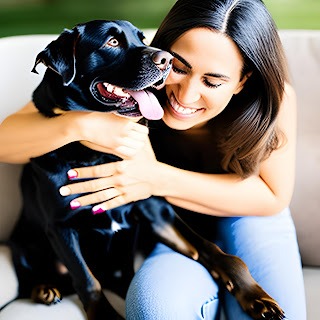Why Does My Dog Bark So Much?
Learn why your dog barks excessively and how to address the behavior.
Let's explore the many reasons why dogs bark excessively, including boredom, anxiety, fear, and territorial behavior. We will also provide tips and strategies for addressing excessive barking, such as positive reinforcement training, environmental enrichment, and socialization. By understanding the root causes of your dog's barking and implementing effective training methods, you can help your furry friend become a happier, more well-behaved companion.
Ah, the sound of incessant barking. It can be enough to drive any dog owner up the wall. But why do our furry friends feel the need to bark so much? Well, there could be a number of reasons. Perhaps they're trying to communicate with us, or maybe they're just bored out of their minds. Maybe they're feeling anxious or afraid, or maybe they just really, really love the sound of their own voice. Whatever the reason, one thing's for sure is that a dog that barks too much is definitely a handful. So if you're dealing with a canine chatterbox, just remember to stay patient and keep your sense of humor. After all, there's nothing quite like the sound of a happy dog - even if it is a little bit loud sometimes.

As a dog owner, it's natural to expect your furry friend to bark from time to time. However, excessive barking can become a nuisance not only to you but also to your neighbors. If your dog is barking too much, there could be several reasons behind it. In this article, we'll discuss some of the most common reasons why dogs bark and what you can do to address the issue.
Here are the top 5 dog breeds that are known to bark the most:
1. Beagle
2. Yorkshire Terrier
3. Chihuahua
4. Miniature Schnauzer
5. German Shepherd
It's important to note that excessive barking can be a sign of anxiety or other behavioral issues. If you're experiencing problems with your dog's barking, it's a good idea to consult with a professional dog trainer or behaviorist.
1. Attention-seeking behavior
Dogs are social creatures and crave attention from their owners. If your dog is barking excessively, it could be a sign that they want your attention. This behavior is common in puppies and can also be seen in adult dogs who feel neglected or bored. To address this issue, try spending more quality time with your dog, playing with them, and giving them plenty of exercise.
2. Separation anxiety
Dogs are pack animals and thrive on being around their owners. When left alone for long periods, some dogs can develop separation anxiety, which can manifest in excessive barking. Signs of separation anxiety include destructive behavior, pacing, and whining. If you suspect that your dog has separation anxiety, try leaving them with a toy or treat to keep them occupied while you're away. Gradually increase the time you spend away from your dog until they become comfortable being alone.
3. Territorial behavior
Dogs are territorial animals and will bark to protect their home and family. This behavior is more common in certain breeds, such as guard dogs or terriers. If your dog is barking excessively at strangers or other animals, it could be a sign that they feel threatened or are trying to protect their territory. To address this issue, try socializing your dog with other animals and people in a controlled environment. This will help them become more comfortable around strangers and reduce their barking.
4. Fear or anxiety
Dogs can become fearful or anxious in certain situations, such as during thunderstorms or when meeting new people or animals. Excessive barking can be a sign that your dog is feeling scared or anxious. To help your dog feel more comfortable, try creating a safe space for them to retreat to during stressful situations. You can also use positive reinforcement techniques to help your dog associate these situations with positive experiences.
5. Medical issues
In some cases, excessive barking can be a sign of an underlying medical issue, such as hearing loss or cognitive dysfunction. If you've ruled out other causes of excessive barking and your dog's behavior continues, it's essential to take them to the vet for a check-up.
If you have a dog that barks excessively, there are several solutions that you can try to address this issue. One option is to provide more exercise and mental stimulation for your dog, as boredom and pent-up energy can contribute to excessive barking. You can also work on training your dog to be quieter on command, using positive reinforcement techniques. Additionally, addressing any underlying anxiety or fear issues that may be causing your dog to bark excessively can also be helpful. It's important to remember that excessive barking can be a symptom of an underlying problem, so if your dog's barking persists despite your best efforts, it may be worth consulting with a veterinarian or animal behaviorist for further guidance.
In conclusion, excessive barking can be a frustrating issue for dog owners, but it's essential to understand the underlying reasons behind it. By identifying the cause of your dog's excessive barking and addressing it appropriately, you can help your furry friend become a happier and more well-behaved companion. Remember to always use positive reinforcement techniques and seek professional help if needed.



.jpg)






